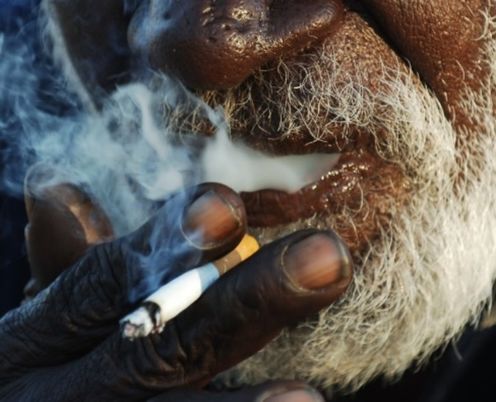
More and more Aboriginal and Torres Strait Islander smokers are quitting and fewer young people are taking up smoking. In ten years, the proportion of former smokers who have successfully quit has jumped from 24% to 37%.
In recent years, Indigenous families, Aboriginal Community Controlled Health Services and governments have increased attention on tackling smoking. Most notably, in 2009, the previous federal government launched the four-year A$100.6 million Tackling Indigenous Smoking program.
Falling Indigenous smoking rates have been among the most optimistic stories in annual Closing the Gap reports.
But at 42%, the daily Aboriginal and Torres Strait Islander smoking rate is still 2.6 times that of other Australians. Smoking is estimated to cause one in five Indigenous deaths and accounts for one-sixth of the health gap.
Despite this, last year’s budget announced a review of and cuts to the Tackling Indigenous Smoking program. After a long period of uncertainty, the Commonwealth government announced on Friday that organisations funded under the previous program will be able to apply for funding as part of a redesigned program. But details of the new program remain sketchy.
What’s working?
While the size of the smoking problem and the slow progress has been reasonably well documented, it has been less clear what is working and what is not. This has changed with the release today of 15 scientific papers in the Medical Journal of Australia from the national Talking About The Smokes project.
We worked with 34 Aboriginal Community Controlled Health Services across the country and in the Torres Strait to interview 2,522 community members to find out what is helping smokers to quit.
We found encouraging news: The majority of Indigenous smokers, as with smokers in the wider community, want to quit. Most know about the worst health effects of smoking, and wish they had never started.
About half of daily smokers had made a quit attempt in the past year (48%) and said smoking was never allowed inside their home (53%). But fewer Aboriginal and Torres Strait Islander smokers than all Australian smokers had been able to quit for a month or longer (47% vs 63%).

Dedicated tobacco control resources or positions at Aboriginal Community Controlled Health Services helped. We found that more of the smokers whose local health service had dedicated tobacco control resources (from any funding source) had tried to quit than of those whose health service did not.
Higher proportions of Indigenous smokers than all Australian smokers recalled a health professional advising them to quit in the past year (75% vs 56% of those seen).
We’re now analysing how many of the smokers made quit attempts and successfully quit in the year after these baseline surveys. These longitudinal analyses will provide more definitive causal interpretations than the cross-sectional associations reported today.
There were some differences within the Aboriginal and Torres Strait Islander population. Often more socioeconomically advantaged smokers were more likely to quit or report behaviours or beliefs along the pathway to quitting, but this was not consistent across all comparisons.
Worth the investment
Our new information shows much is working and continued government investment in the Tackling Indigenous Smoking program is justified, even in a tight budgetary environment.
This evidence can guide the evolution of that program, but also reminds readers that this is only part of the necessary comprehensive approach needed. Indigenous smoking is also being tackled by mainstream tobacco control activities (advertising campaigns, pack warnings and plain packaging, and smoke-free regulation) and activities already incorporated into routine health care (brief advice and individual cessation support).
Aboriginal and Torres Strait Islander communities would welcome more government support to reduce smoking. We found that 80% of daily smokers agreed that the government should do more to tackle the harms caused by smoking.
This is not just another case of asking for more government dollars in the long line of requests on the health budget. Aboriginal and Torres Strait Islander smokers themselves are already making changes to often entrenched behaviours caused by an addictive product.
But now is the time for the government to provide some certainty that it will support the comprehensive list of activities that should assist more Indigenous smokers to quit.
Smokers are already being well-supported by their local Aboriginal Community Controlled Health Services. Staff at these health services can go further, especially helping smokers to sustain their quit attempts for longer, confident that their messages about quitting will be understood and welcomed.
David Thomas leads the Talking about the Smokes project in partnership with a team from the National Aboriginal Community Controlled Health Organisation and all its Affiliates, the University of Melbourne, and Cancer Council Victoria. The project is funded by the Australian Government Department of Health.
